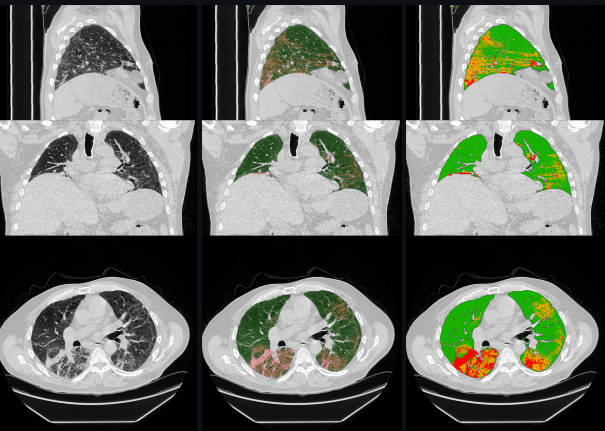L3-Net Version 3.0
Project phases
- Phase 1 - Open Source AI Model for COVID-19 CT Diagnostics and Prognosis
- Phase 2 - Demo – Version 1
- Phase 3 - Application - Version 2
- Phase 4 - L3-Net Version 3.0 (current page)
Since February 2020 and Phase 1 of this project, a machine learning approach has been taken to develop the segmentation algorithm COVID-L3-Net. To build on the utility of CT Scan as a triaging tool, radiologists sought to further refine the outputs of the L3-Net to materially improve prognostication of COVID-19 severity and patient outcomes.
In this recent body of work, Phase 3 of the L3-Net model was trained on an additional 18 384 axial CT slices from 670 CT series obtained from multiple hospital sites, with drastically increased performance on lung segmentation and pulmonary vessel exclusion using established methodologies for lung detection and vessel segmentation in the data pre-processing steps.
Updates include simplification of pulmonary opacification types to normal/healthy lung, ground-glass opacity + crazy-paving, and consolidation. Building from the Phase 2 data labeling approach, areas of high certainty opacities were labeled, allowing the model to focus learning on highly specific areas. This change allowed the model more freedom to label mixed-opacities and low-certainty areas more flexibly.
Approach
The Phase 3 model now detects normal lung, ground-glass or crazy-paving, and consolidation.
The code for this application is available in a GitHub repo for users to deploy using their own AWS accounts. By cloning the repo and deploying to your own local machine, you will be able to keep all of your data in your own S3 bucket and still utilize AWS cloud computing to provide real time AI interpretations.
Supporting Artifacts
Link to Github Repository: https://github.com/UBC-CIC/COVID19-L3-Net-Phase3
Photo screenshots taken from project GitHub.
About the University of British Columbia Cloud Innovation Centre (UBC CIC)
The UBC CIC is a public-private collaboration between UBC and Amazon Web Services (AWS). A CIC identifies digital transformation challenges, the problems or opportunities that matter to the community, and provides subject matter expertise and CIC leadership.
Using Amazon’s innovation methodology, dedicated UBC and AWS CIC staff work with students, staff and faculty, as well as community, government or not-for-profit organizations to define challenges, to engage with subject matter experts, to identify a solution, and to build a Proof of Concept (PoC). Through co-op and work-integrated learning, students also have an opportunity to learn new skills which they will later be able to apply in the workforce.

